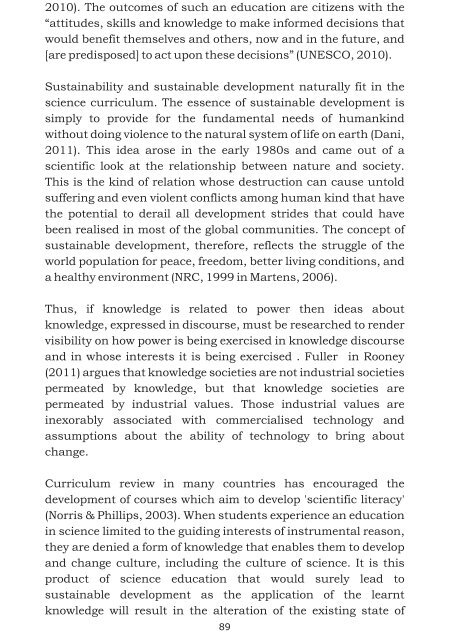Beneficiaries are actors too.pdf - Southern Institute of Peace ...
Beneficiaries are actors too.pdf - Southern Institute of Peace ...
Beneficiaries are actors too.pdf - Southern Institute of Peace ...
Create successful ePaper yourself
Turn your PDF publications into a flip-book with our unique Google optimized e-Paper software.
2010). The outcomes <strong>of</strong> such an education <strong>are</strong> citizens with the<br />
“attitudes, skills and knowledge to make informed decisions that<br />
would benefit themselves and others, now and in the future, and<br />
[<strong>are</strong> predisposed] to act upon these decisions” (UNESCO, 2010).<br />
Sustainability and sustainable development naturally fit in the<br />
science curriculum. The essence <strong>of</strong> sustainable development is<br />
simply to provide for the fundamental needs <strong>of</strong> humankind<br />
without doing violence to the natural system <strong>of</strong> life on earth (Dani,<br />
2011). This idea arose in the early 1980s and came out <strong>of</strong> a<br />
scientific look at the relationship between nature and society.<br />
This is the kind <strong>of</strong> relation whose destruction can cause untold<br />
suffering and even violent conflicts among human kind that have<br />
the potential to derail all development strides that could have<br />
been realised in most <strong>of</strong> the global communities. The concept <strong>of</strong><br />
sustainable development, therefore, reflects the struggle <strong>of</strong> the<br />
world population for peace, freedom, better living conditions, and<br />
a healthy environment (NRC, 1999 in Martens, 2006).<br />
Thus, if knowledge is related to power then ideas about<br />
knowledge, expressed in discourse, must be researched to render<br />
visibility on how power is being exercised in knowledge discourse<br />
and in whose interests it is being exercised . Fuller in Rooney<br />
(2011) argues that knowledge societies <strong>are</strong> not industrial societies<br />
permeated by knowledge, but that knowledge societies <strong>are</strong><br />
permeated by industrial values. Those industrial values <strong>are</strong><br />
inexorably associated with commercialised technology and<br />
assumptions about the ability <strong>of</strong> technology to bring about<br />
change.<br />
Curriculum review in many countries has encouraged the<br />
development <strong>of</strong> courses which aim to develop 'scientific literacy'<br />
(Norris & Phillips, 2003). When students experience an education<br />
in science limited to the guiding interests <strong>of</strong> instrumental reason,<br />
they <strong>are</strong> denied a form <strong>of</strong> knowledge that enables them to develop<br />
and change culture, including the culture <strong>of</strong> science. It is this<br />
product <strong>of</strong> science education that would surely lead to<br />
sustainable development as the application <strong>of</strong> the learnt<br />
knowledge will result in the alteration <strong>of</strong> the existing state <strong>of</strong><br />
89


